GRIP 2 Engelsk
 ANNE LISE SVENDAHL KVAM | ELWIRA PAJAK | ANNELÉN T.A. STEN BAKKEN
ANNE LISE SVENDAHL KVAM | ELWIRA PAJAK | ANNELÉN T.A. STEN BAKKEN
ARBEIDSBOK
ANNE LISE SVENDAHL KVAM | ELWIRA PAJAK | ANNELÉN T.A. STEN BAKKEN
ANNE LISE SVENDAHL KVAM | ELWIRA PAJAK | ANNELÉN T.A. STEN BAKKEN
ARBEIDSBOK

 ANNE LISE SVENDAHL KVAM | ELWIRA PAJAK | ANNELÉN T.A. STEN BAKKEN
ANNE LISE SVENDAHL KVAM | ELWIRA PAJAK | ANNELÉN T.A. STEN BAKKEN
ARBEIDSBOK
ANNE LISE SVENDAHL KVAM | ELWIRA PAJAK | ANNELÉN T.A. STEN BAKKEN
ANNE LISE SVENDAHL KVAM | ELWIRA PAJAK | ANNELÉN T.A. STEN BAKKEN
ARBEIDSBOK
Copyright © 2023 by Vigmostad & Bjørke AS All Rights Reserved
1. utgave 2023 / 1. opplag 2023
ISBN: 978-82-11-04624-6
Grafisk produksjon: John Grieg, Bergen
Omslagsdesign ved forlaget
Spørsmål om denne boken kan rettes til: Fagbokforlaget Kanalveien 51 5068 Bergen Tlf.: 55 38 88 00
e-post: fagbokforlaget@fagbokforlaget.no www.fagbokforlaget.no
Materialet er vernet etter åndsverkloven. Uten uttrykkelig samtykke er eksemplarfremstilling bare tillatt når det er hjemlet i lov eller avtale med Kopinor.
GRIP er et læreverk for voksne innvandrere som får tilpasset grunnopplæring på nivået under videregående.
Arbeidsboken er et viktig supplement til grunnboken. Bakerst i arbeidsboken er alle glosene (keywords) fra grunnboken samlet alfabetisk. Vi anbefaler også at deltakerne bruker mini-grammatikken (Mini-grammar) bakerst i grunnboken aktivt i arbeidet med oppgavene.
Strukturen i arbeidsboken speiler grunnbokens og består av fem hoveddeler:
1 New beginnings
2 Summer holidays 3 Back to school 4 Autumn break
5 Celebrations
Oppgavene i arbeidsboken følger tekstene i grunnboken. Oppgavene er varierte og trener alle ferdigheter i engelskfaget. Hver oppgave er merket med den ferdigheten som skal trenes.
Ikoner i arbeidsboken
Jobb i par Jobb i gruppe
Sidehenvisninger til tekstene i Grip 2 Engelsk Grunnbok
GRIP 2 Engelsk Arbeidsbok dekker kompetansemålene etter 7. trinn i læreplan i engelsk etter fagfornyelsen og modul 3 i forsøkslæreplan i engelsk for forberedende voksenopplæring (FVO).
Anne Lise Svendahl Kvam Elwira Pajak Annelén T.A. Stenbakken
Seagulls in Sognefjorden, Norway.

› WRITE
In your notebook, write down the keywords in Norwegian and your first language.

– barbecue – amusement park
GRAMMAR NOTE
Auxiliary verbs would, should and could are auxiliary verbs. We use auxiliary verbs together with main verbs.
EXAMPLES would be, should say, could become
› WRITE Make sentences and write them down in your notebook.
1 Write two sentences with would. 2 Write two sentences with should 3 Write two sentences with could.
› WRITE ›› TALK
Prepare questions and act out a job interview with a classmate. Change roles so both can act out the role of interviewer and of job applicant. You are the manager of a busy petrol station or hair salon, and now you need to hire a new employee.
1 Write down 10 questions that you would like to ask someone at a job interview.
2 Make a job interview with someone in your class. Ask them the 10 questions you have written down.
GRAMMAR NOTE
• do + I, you, we & they + the infinitive
• does + he, she & it + the infinitive – no ‘s’ at the end
You work late every day. Do you work late every day?
He works late every day. Does he work late every day?
She drinks too much coffee. Does she drink too much coffee? They drink too much coffee. Do they drink too much coffee?
What do you think? (asking about your opinion)
We reply: I think …
What do you do? (asking about your occupation)
We reply: I’m a driver. I’m a student. I work as a carpenter.
Exercise 4 Translate
› WRITE ›› TALK
In your notebook, translate the sentences into Norwegian and your first language. Discuss in groups how you express the present tense in your first language and in Norwegian.
1 I speak five languages. 2 Sita speaks four languages. 3 How many languages do you speak? 4 What do you do? 5 What does Alex do? 6 What time does Ali have a job interview? 7 He has a job interview at 9 a.m. 8 What time does the bus come? 9 The bus comes at 8:45.
› WRITE
Complete the questions about the words in blue.
1 Sita wants to visit her cousin in London in October.
Who ? 2 Sita wants to visit her cousin in London in October.
When ? 3 Yonas wants to go to the US this summer. Where ? 4 Yonas wants to go to the US this summer When ?
5 Sita wants to make food for a living. What ? 6 Aziza wants to work in a nursery. Where ?

We use do or does in positive answers, and don’t or doesn’t in negative answers.
don’t = do not doesn’t = does not
EXAMPLES Questions Short answers
Do you work in a nursery? Yes, I do. No, I don’t.
Do they come from Norway? Yes, they do. No, they don’t.
Does he speak five languages? Yes, he does. No, he doesn’t.
Does she have a family in Norway? Yes, she does. No, she doesn’t.
Does it matter? Yes, it does. No, it doesn’t.
Exercise 6 Correct the sentences
› WRITE
Correct the sentences and write them down in your notebook.
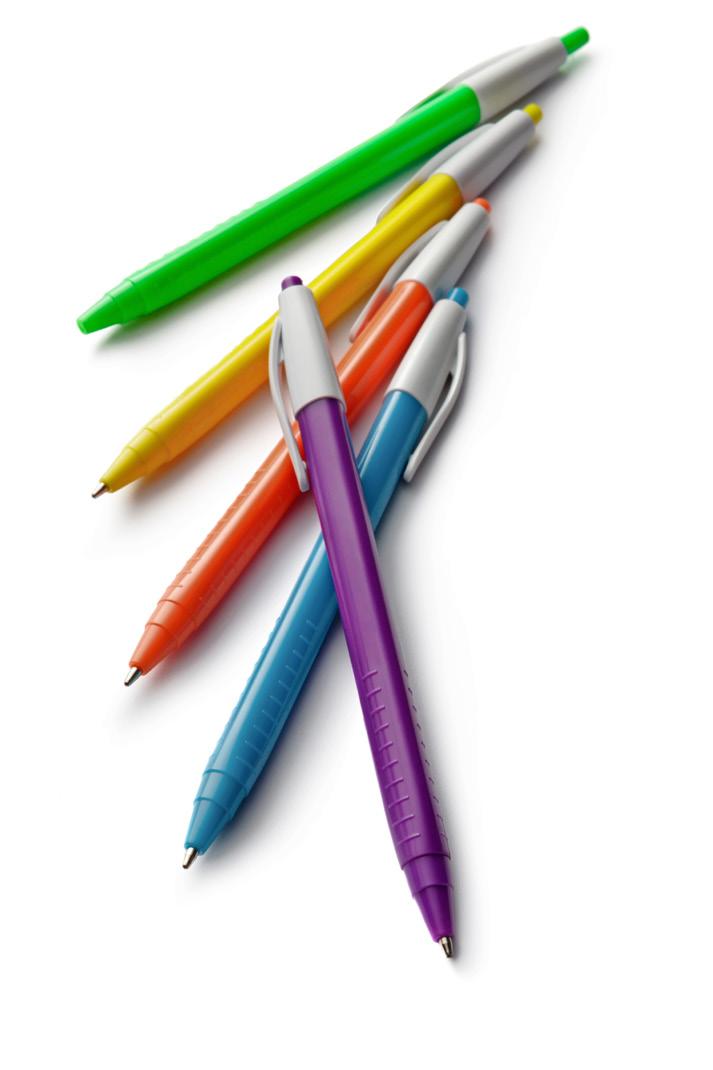
1 Yonas isn’t from Ethiopia but he come from Eritrea.
2 Sita speak four languages but she don’t use all of them every day.
3 Hassan doesn’t wants to be a teacher.
4 Hassan’s children goes to a Norwegian school.
5 Yonas think he is in love.
6 Maria feel lonely and want to focus on work.
Exercise 7 Correct the sentences › WRITE Put the words and phrases in the correct order and write the sentences in your notebook. 1 cousin live Sita’s in Does London ? 2 Alex Sita and Do to every summer go India ?
Exercise 9 Write a short text
› WRITE
Write your own CV on your computer where you include


• personal information (name, address, date of birth, nationality, languages)

• education (schools, courses, exams)
• work experience
• other skills
• interests and hobbies

Exercise 10 Study and describe
› TALK
Look at the pictures.
• Describe the people.
• What type of job do you think they may have?
› TALK
Discuss in class.
1 What type of job can a person with no education get in Norway?
2 How can someone make a lot of money fast? Any ideas?
3 What advice will you give to someone who is going to a job interview?
4 What do you prefer:
• an interesting job?
• a well-paid job?
• a job where you help others?
• a job where you can use your talents?
› TALK
What should you do and what should you not do at a job interview?
Discuss with a classmate.
• I should be on time.
• I should ask about the salary first.
• I should bring flowers or chocolate.
• I should turn off my phone.
• I should tell some jokes.
• I should give compliments.
• I should wear perfume.
• I should talk about my dog.
› READ ›› TALK
Read the sentences below. What do they mean?
Discuss with a classmate.
1
Ali should buy new sneakers.
2 Ali could buy new sneakers.
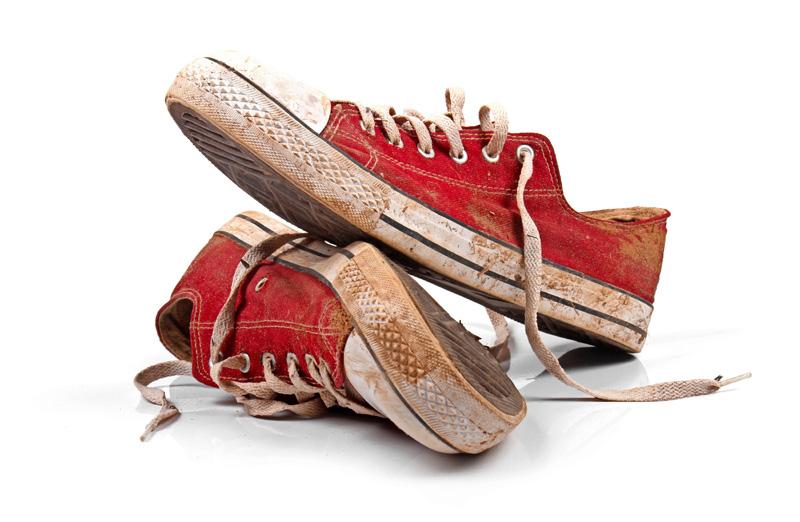
3
Ali would buy new sneakers if he had money.
› WRITE
In your notebook, write down the keywords in Norwegian and your first language.
– prenatal control – check-up – midwife – appointment – pregnancy – normal – get leave
› LISTEN ›› TALK
– due date – go into labour – during the delivery – positioning – blood pressure – urine sample – heartbeat
– belly – bum – rib cage – discomfort – anxiety
Look up the words and phrases in an online dictionary. Listen to and repeat them. • prenatal control • check-up • pregnancy • due date • during • positioning • rib cage • anxiety
The letter ‘u’ is often pronounced with a ‘j’ sound in front of the ‘u’ sound. U /ju:/
We find this sound in these words: EXAMPLES
• a due date
• during
• a few
• a nephew
• university We also find this sound in some words that are not written with the letter ‘u’:
• a view
• an interview
Exercise 3 Match the phrases
READ Match the words to the correct description. 1 pregnancy a to relax 2 appointment b the beats made by the heart 3 due date c to be expecting a child 4 discomfort d not pleasant 5 to put your feet up e the pressure of the blood through the veins 6 environmental engineer f a scheduled meeting 7 blood pressure g not pleasant 8 heartbeat h the expected day of birth
Exercise 4 Fill in the missing words
› WRITE Fill in the missing words in the sentences below. husband, midwife, pregnant, heartbeat, baby, prenatal control 1 Nimo is 2 She is carrying a 3 Nimo’s works in Scotland. 4 She is a 5 The midwife gives Nimo a 6 She helps Nimo listen to her baby’s
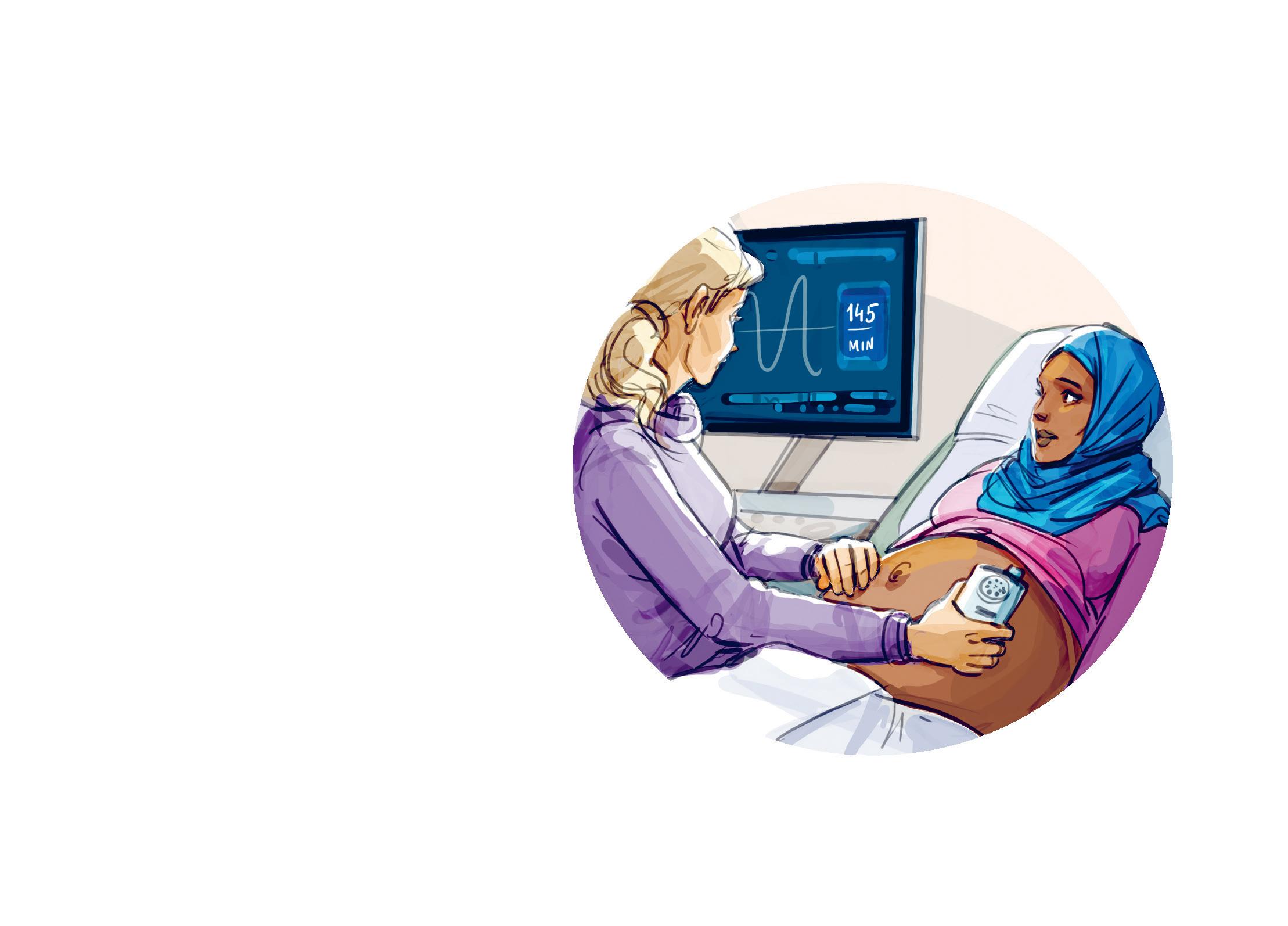
Exercise 5 Fill in the missing words
› WRITE Fill in the correct form of the adjectives and nouns. Adjective Noun 1 pregnant 2 anxious 3 plan
Exercise 6 Read and answer › READ ›› WRITE
1 Translate the words and phrases into Norwegian and your first language. Use a dictionary. English Norwegian Your first language foetus womb (uterus) placenta umbilical cord urinary bladder vagina rectum
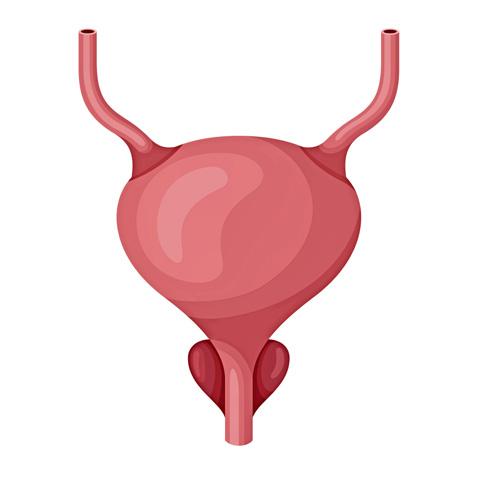

a
c d b
e g
f
2 Use the pictures above to place the words in the correct place. You can search the internet to get more information. A pregnant woman carries a a) in her b) . The c) feeds the foetus through an d) , which connects the mother and the foetus. When the foetus grows, it often presses on the e) . That is why pregnant women often have to pee. Unless the mother or foetus needs medical help, the baby is born through the f) .

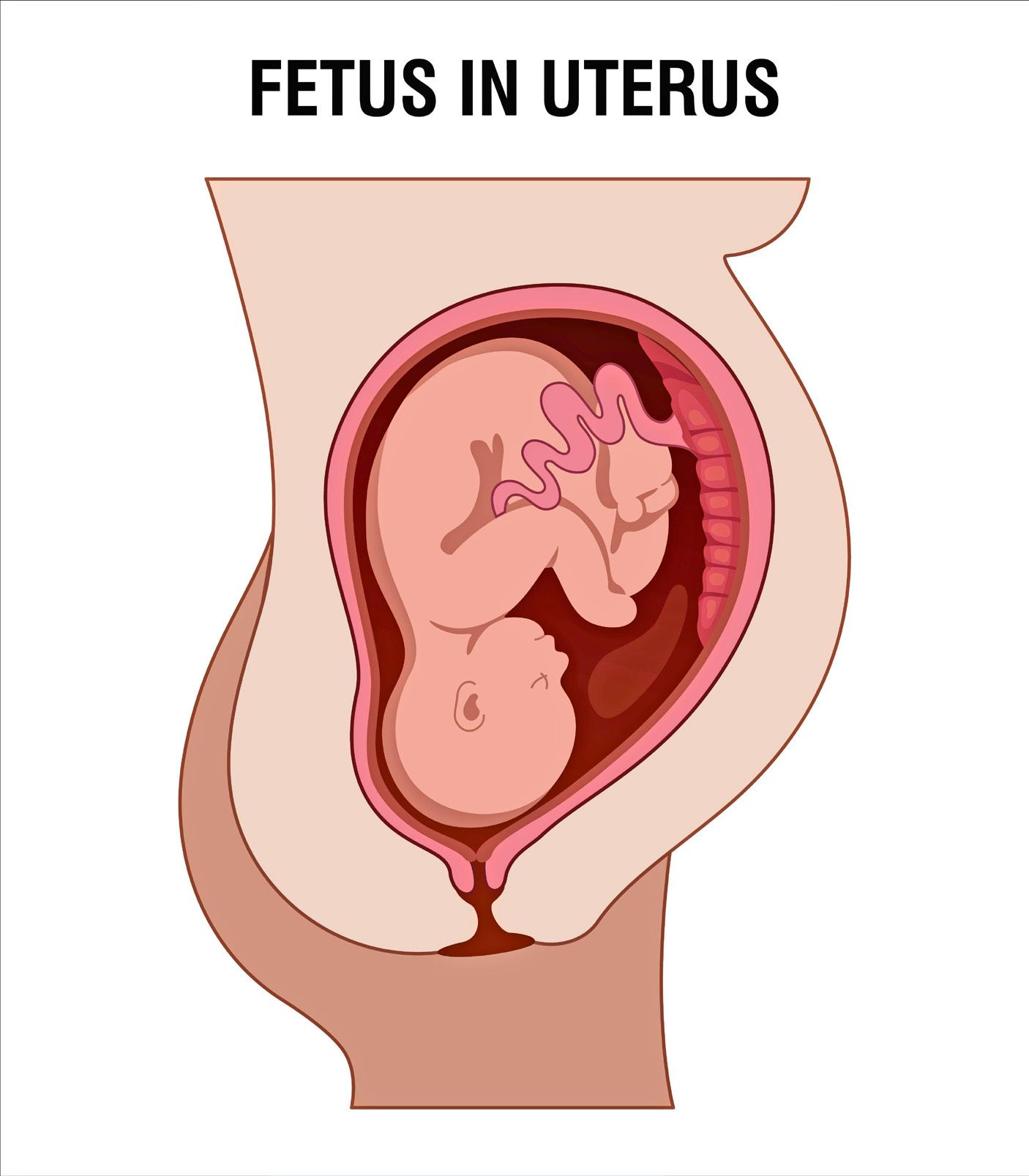
1 New beginnings • Nimo’s prenatal control
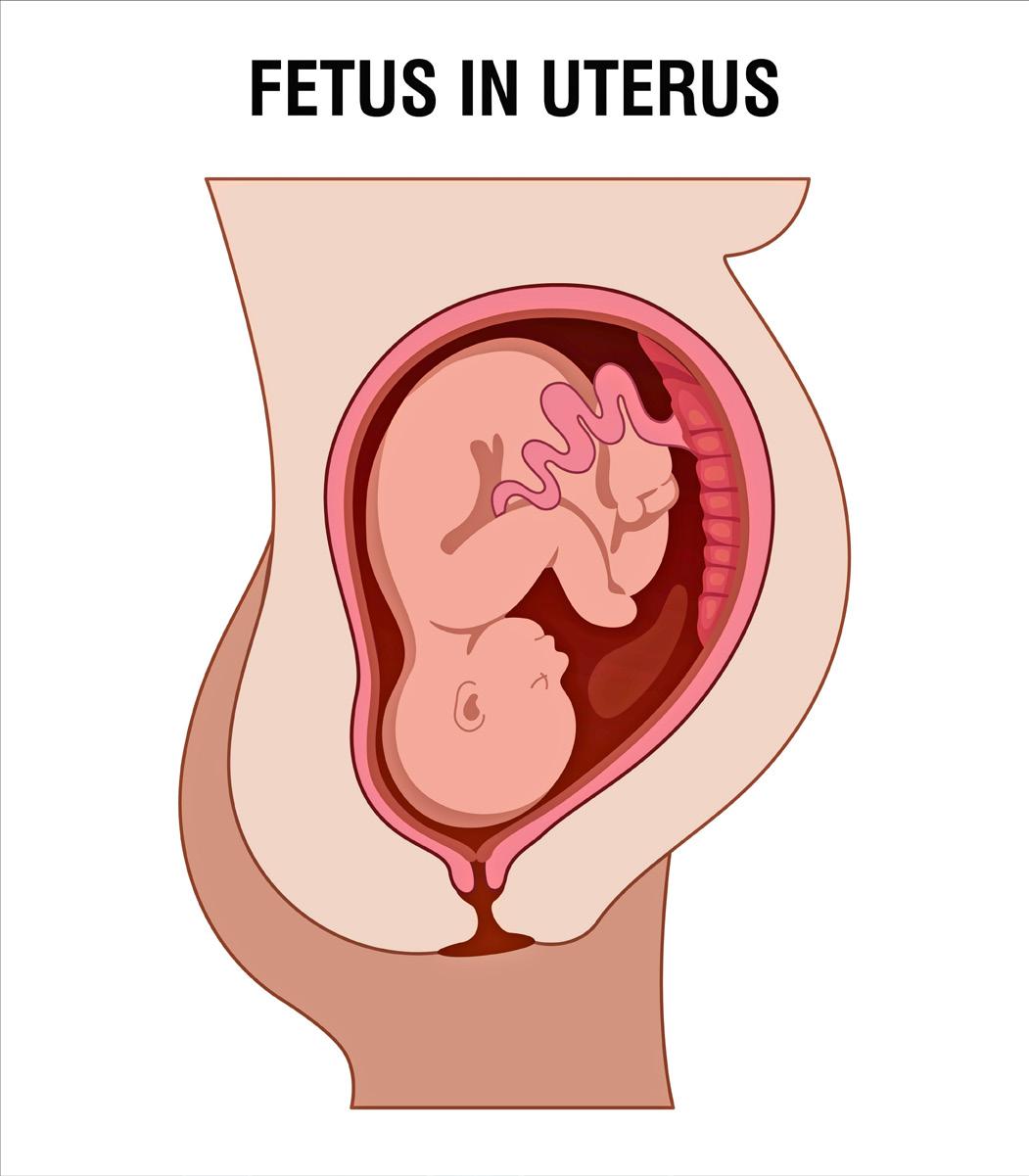
We often refer to an unborn child as a baby, but the correct term is ‘embryo’
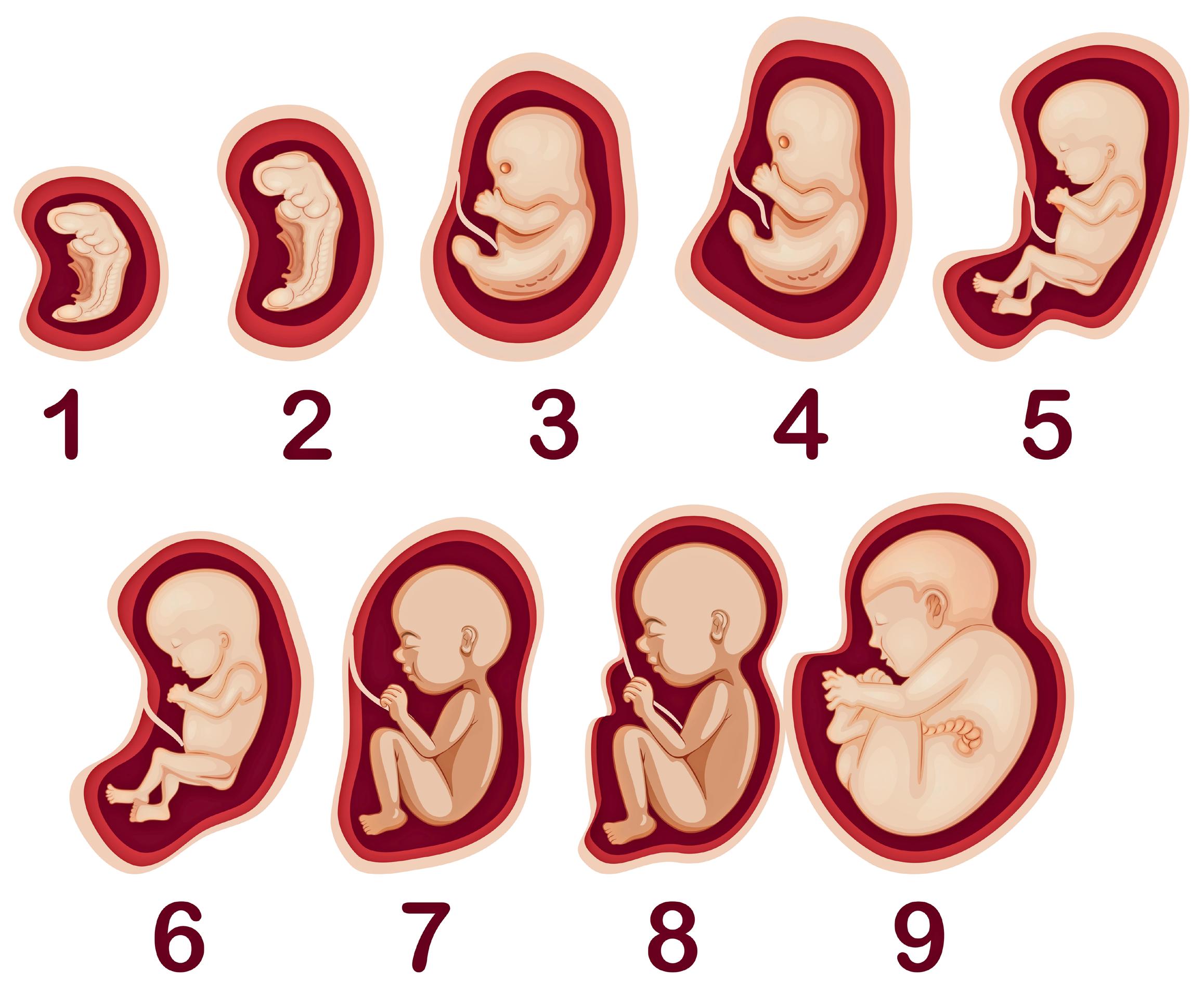

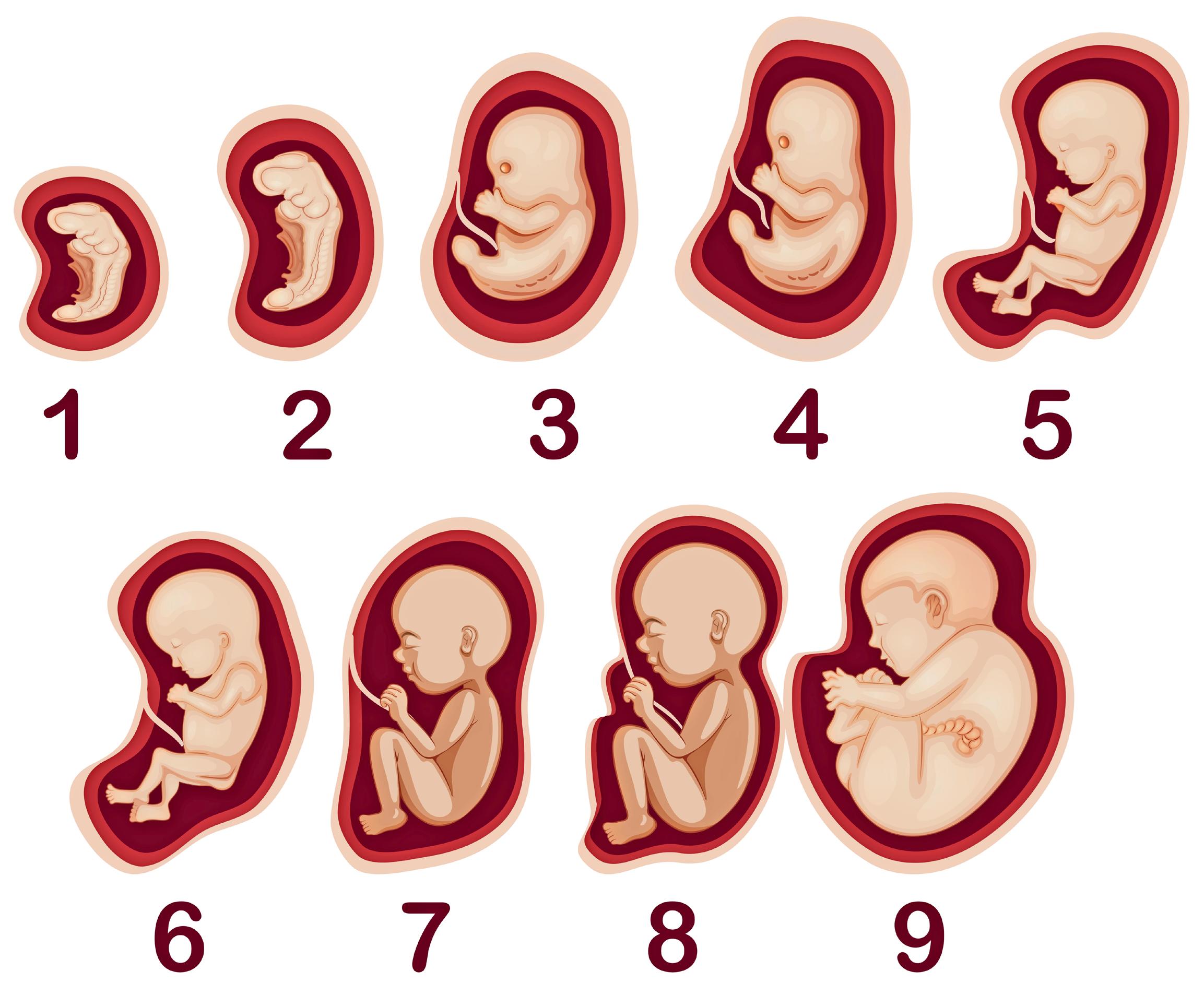
When talking about a person’s bottom, we use different words in different situations. Some of these words are rude and you should avoid using them. Informal expressions can often be used with family and friends.
bottom – the body part you sit on – neutral word buttocks – a person’s bottom is a pair of buttocks, the left and the right buttock – neutral word butt – informal word (mainly US) bum – informal word, often used with children (mainly UK) tush – informal word, often used with children (mainly US) backside – informal word, often used with adults when bottom or buttocks seems too formal arse – a rude word (UK spelling) ass – a rude word (US spelling)
We use different question words based on the information we want.
• what to ask for information
• who to ask about a person
• when to ask about time
• why to ask for a reason
• where to ask about a place
• which when you have alternatives
• how to ask about the way something is done
Across 2 to ask for a reason 3 to ask about a person 4 to ask about a place 5 to ask for information
Down
1 to ask about the way something is done 2 to ask about time 3 when you have alternatives

9 Make questions › WRITE Make yes/no-questions with these words. 1 are at school your children ? 2 your friend ill is today ? 3 funny is the film ? 4 is nearby the school ? 5 for work are late you ? 6 is at home your mother ? 7 all right you are ? 8 from here are you ?

Read, listen and sing along to the song about Desmond and Molly.
Ob-la-di, ob-la-da Text: John Lennon and Paul McCartney
Desmond has a barrow in the marketplace Molly is the singer in a band Desmond says to Molly, “Girl, I like your face”
And Molly says this as she takes him by the hand (Chorus)
Ob-la-di, ob-la-da, life goes on, brah La-la, how their life goes on Ob-la-di, ob-la-da, life goes on, brah La-la, how their life goes on
Desmond takes a trolley to the jeweler’s store (Chu chu chu) Buys a twenty-carat golden ring (Ring) Takes it back to Molly waiting at the door And as he gives it to her, she begins to sing (Sing)
(Repeat chorus)
In a couple of years, they have built a home sweet home
With a couple of kids running in the yard Of Desmond and Molly Jones (Ha, ha, ha, ha, ha, ha)
Happy ever after in the marketplace
Desmond lets the children lend a hand (Arm, leg)
Molly stays at home and does her pretty face And in the evening, she still sings it with the band Yes!
(Repeat chorus)
In a couple of years, they have built a home sweet home With a couple of kids running in the yard Of Desmond and Molly Jones (Ha, ha, ha, ha, ha) Yeah!
Happy ever after in the marketplace
Molly lets the children lend a hand (Foot) Desmond stays at home and does his pretty face
And in the evening, she’s a singer with the band (Yeah)
(Repeat chorus)
And if you want some fun Take Ob-la-di-bla-da Ahh, thank you
Listen to the song ‘Ob-la-di, ob-la-da’ and discuss the following questions with a classmate.
1 What do you think it means when Molly takes Desmond by the hand in the first verse?
2 Why do think Desmond buys Molly a ring in the second verse?
3 There are kids running in the yard in verse three. What does this tell us about Desmond and Molly?
4 Do you like or dislike this song? Explain your answer.

Exercise
› WRITE
In your notebook, write down the keywords in Norwegian and your first language.
– arrival – crib – breast pump
– half off – baby shower – refuse
– hush – disrespectful – one of a kind
The letters ‘ch’ are usually pronounced /ʧ/, but sometimes they are pronounced /k / or /ʃ/.
EXAMPLES
When ‘ch’ is pronounced /ʧ/
• church • chuckle
• child
EXAMPLES
When ‘ch’ is pronounced /k /:
• chemist
• chemistry
• technology
• stomach
EXAMPLES
When ‘ch’ is pronounced /ʃ/:
• machine
• chef
Exercise 3 Discuss


TALK Discuss with a classmate 1 When is a baby old enough to sleep in a separate room? 2 What are the pros and cons of a baby sharing a bed with its parents?
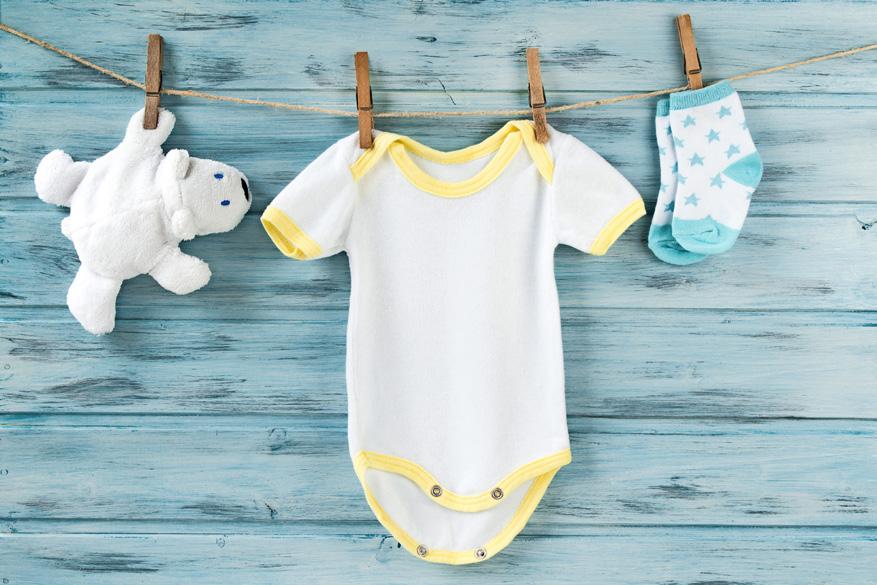



Work in pairs. Look at the vocabulary below and explain what the items are used for.
dummy bib pram
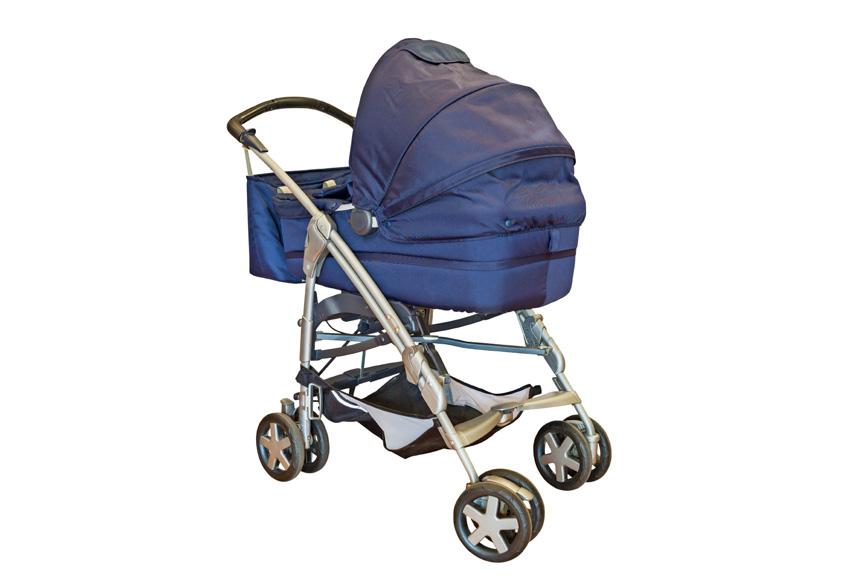

diaper romper crib

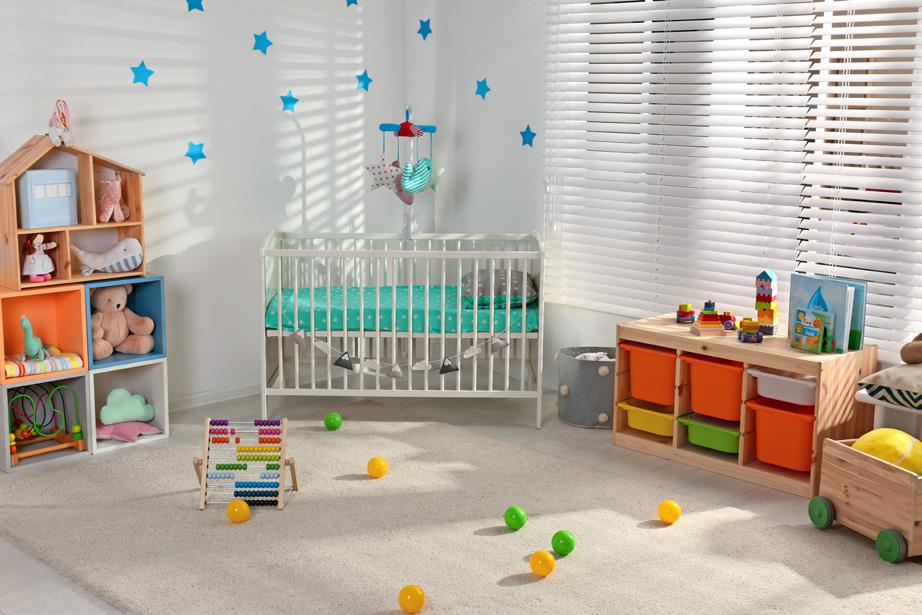
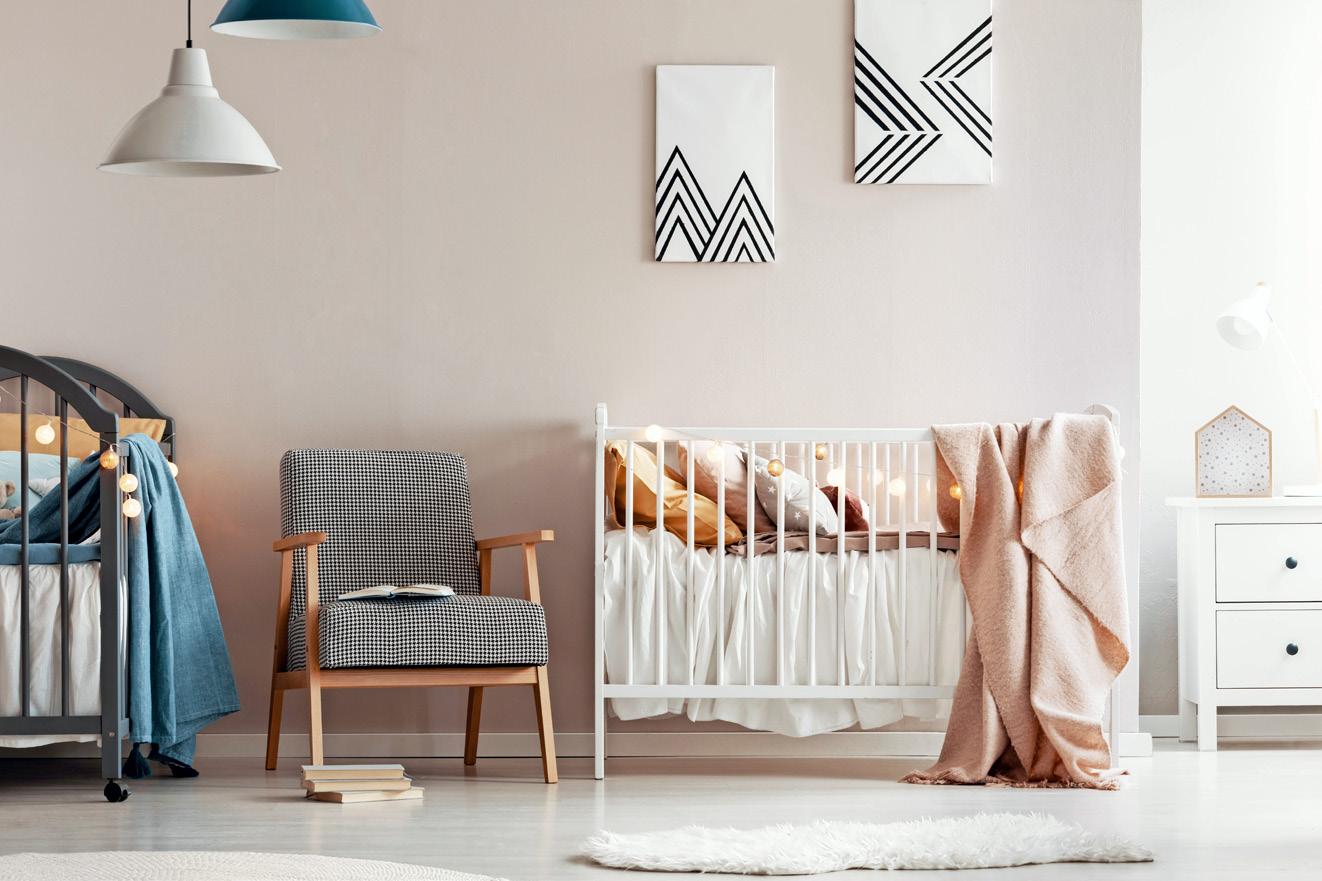
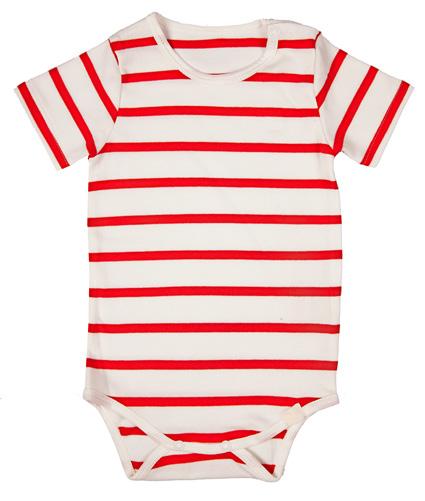
baby bottle cuddly toy nursery
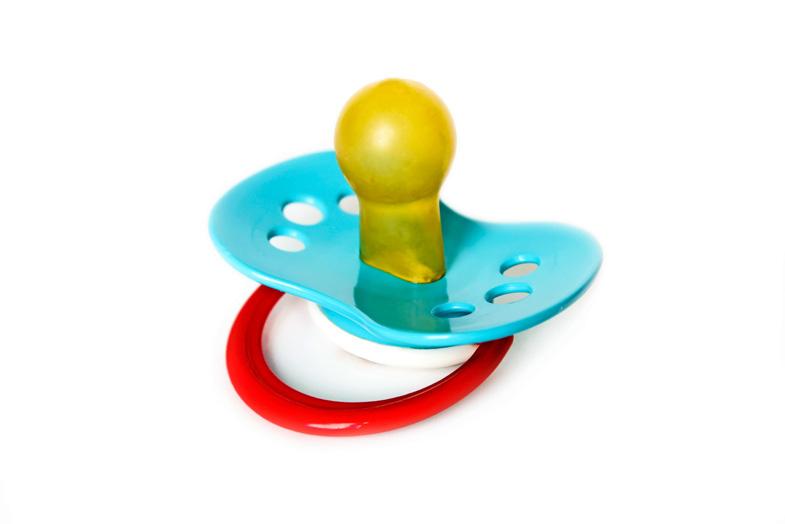

We use adjectives to describe things and people.
EXAMPLES
The adjectives are often placed in front of a noun:
I see a red house. She has a big heart.
Sometimes the adjectives can be placed after verbs: Jenny is sad. The dog is hungry.
Adjectives can also describe pronouns: He is happy.
Exercise 5 Find the words › READ Find the adjectives in the word cloud below.
pump
› WRITE
Write five sentences about the baby, and use an adjective in each sentence. 1 2 3 4 5

› TALK
Discuss with a classmate.
1 Pink is for girls, and blue is for boys. Do you agree or disagree with this statement? Explain your answer.
2 Are boys and girls treated differently in any cultures you are familiar with?
We use ‘the’ about one specific thing or specific things. a boy (John) + a boy (Teddy)
EXAMPLES
I see two boys. John is a boy. Teddy is a boy. I see the tall boy. The boy is tall. the boy = refers to a specific boy We also use ‘the’ when something is known to the reader. the boy I see a tall boy. The tall boy is called Teddy. the boy = the boy was known
› READ ›› WRITE
Write a or the in the correct places below.
• Benji has cat.
• cat sleeps in his room.
• It is very kind cat, but it is also very lazy.

• Benji plays with cat every morning.
• cat only likes to play on the floor.
› WRITE
Translate the words and phrases into Norwegian and your first language. Use a dictionary. English Norwegian Your first language a pink book the green bike the tall building a nice lady a scary house the new teacher a small cup the last sandwich

› WRITE
In your notebook, write down the keywords in Norwegian and your first language.
– worried
– trainers – worn out – mess – clear
GRAMMAR NOTE
– in person – petrol station – enter – manager
– work experience – handle – references – temporary staff
Verbs in the present tense and the infinitive Verbs in the present tense look the same as the verb in the infinitive.
Used with he /she/it the verb gets an -s at the end.
EXAMPLES I You He/she/it work +s We You They
Verbs that end in -s/-ss/-sh/-ch and -x in the infinitive, get -es in the third person singular.
I You He/she/it miss/brush/catch + es We You They
The verbs to go/to do get -es in the third person singular. I You He/she/it go/do + es We You They
› WRITE Write the verbs in the present simple. to be to have to do to work I am have do work you are he she it we you they
› WRITE
Fill in the verbs to be, to have, to do in the present simple.
• Ali from Afghanistan.
• He a student, but he also a job.
• Ali not like his job, because it boring.
• Ali a very nice teacher at school. His name Olav.
• When Ali homework he sits by the kitchen table.
• Sometimes he a glass of juice and some biscuits.
• In the evenings he yoga or goes jogging.
› WRITE
Write the verbs in the present simple.
• Tina (be) a preschool teacher. She (like) children.
• Sometimes she (play) with them, and sometimes she (help) them get dressed.
• The kindergarten (be) not far from Tina’s house so Tina (walk) to work every day.
• Her friend Mona (work) at a garage. She (be) a mechanic.
• Every day she (repair) broken cars. She (want) to be a good mechanic.
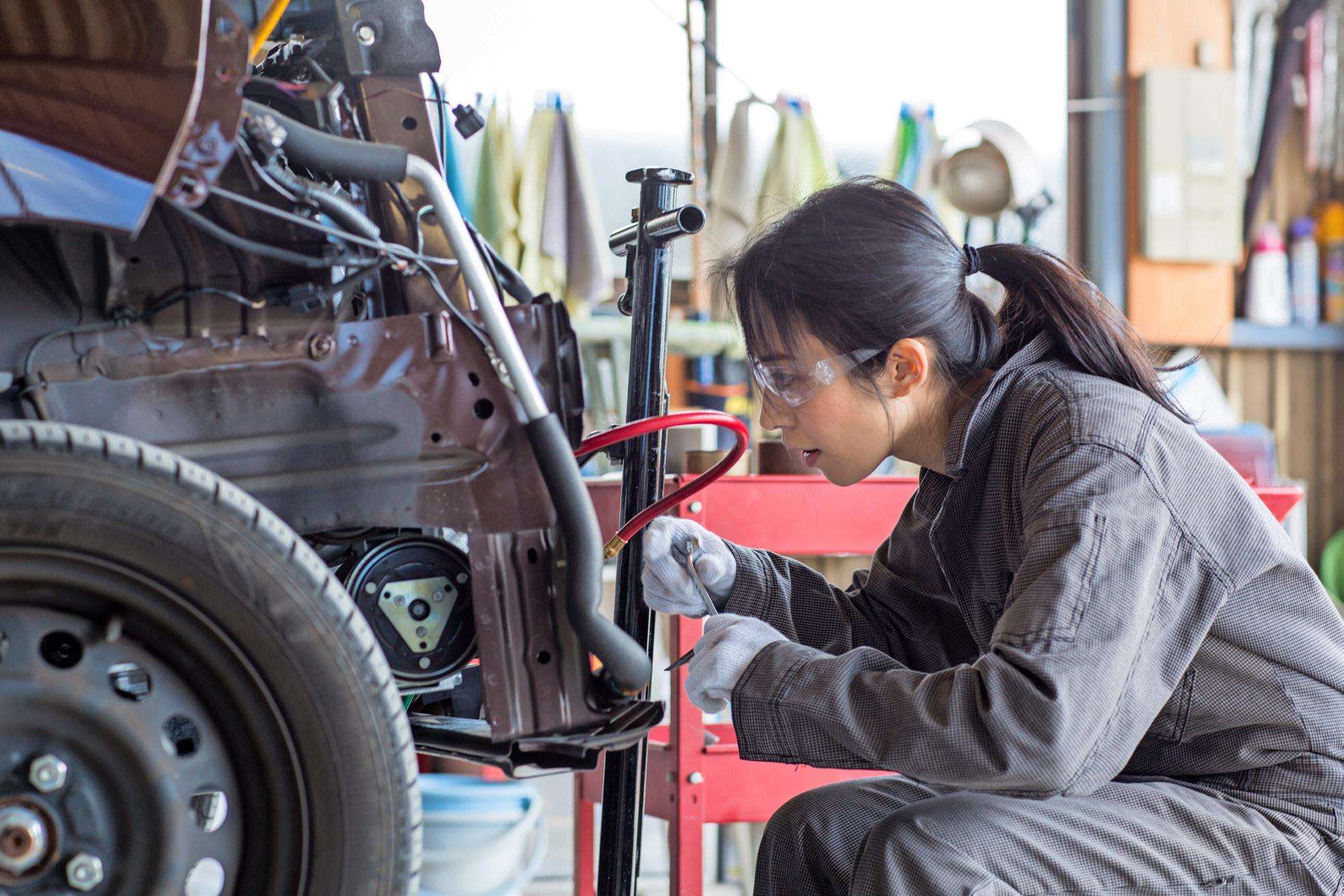
Don’t worry, be happy
Text: Robert McFerrin Jr.
Here’s a little song I wrote You might want to sing it note for note Don’t worry, be happy In every life we have some trouble But when you worry you make it double Don’t worry, be happy Don’t worry, be happy now (Chorus) don’t worry (Ooh, ooh ooh ooh oo-ooh ooh oo-ooh) be happy (Ooh, ooh ooh ooh oo-ooh ooh oo-ooh) don’t worry, be happy (Ooh, ooh ooh ooh oo-ooh ooh oo-ooh) don’t worry (Ooh, ooh ooh ooh oo-ooh ooh oo-ooh) be happy (Ooh, ooh ooh ooh oo-ooh ooh oo-ooh) don’t worry, be happy
Ain’t got no place to lay your head Somebody came and took your bed Don’t worry, be happy The landlord say your rent is late He may have to litigate Don’t worry, be happy
Oh, ooh ooh ooh oo-ooh ooh oo-ooh don’t worry, be happy Here I give you my phone number, when you worry, call me, I make you happy, don’t worry, be happy) Don’t worry, be happy
Ain’t got no cash, ain’t got no style Ain’t got no gal to make you smile Don’t worry, be happy ‘Cause when you worry your face will frown And that will bring everybody down So don’t worry, be happy
Now there, is this song I wrote I hope you learned note for note Like good little children, don’t worry, be happy
Now listen to what I said, in your life expect some trouble When you worry you make it double But don’t worry, be happy, be happy now don’t worry (Ooh, ooh ooh ooh oo-ooh ooh oo-ooh) be happy (Ooh, ooh ooh ooh oo-ooh ooh oo-ooh) don’t worry, be happy don’t worry (Ooh, ooh ooh ooh oo-ooh ooh oo-ooh) be happy (Ooh, ooh ooh ooh oo-ooh ooh oo-ooh) don’t worry, be happy don’t worry, don’t worry (Ooh, ooh ooh ooh oo-ooh ooh oo-ooh) don’t worry, don’t do it, be happy (Ooh, ooh ooh ooh oo-ooh ooh oo-ooh) put a smile in your face (Ooh, ooh ooh ooh oo-ooh ooh oo-ooh) don’t bring everybody down like this don’t worry (Ooh, ooh ooh ooh oo-ooh ooh oo-ooh) it will soon pass, whatever it is (Ooh, ooh ooh ooh oo-ooh ooh oo-ooh) don’t worry, be happy (Ooh, ooh ooh ooh oo-ooh ooh oo-ooh) I’m not worried, I’m happy
‘Ain’t’ means ‘am not’, ‘is not’, ‘are not’, ‘have not’ and ‘has not’.
It’s considered very informal English so don’t use it in the written exam.
› TALK
Listen to the song, read the lyrics and discuss in class.
1 ‘Don’t worry, be happy’ is one of Ali’s favourite songs, but what is Ali worried about as the summer holiday begins?
2 What difficulties does the person in the song strive with?
3 What do you think this line from the song lyrics means? ‘In every life we have som trouble, but when you worry you make it double.’
4 What do you do when you feel worried about something?
5 What things do you often worry about?
› READ ›› WRITE
Read the lyrics and listen to the song ‘Don’t worry, be happy’. Then, write two short paragraphs in your notebook.
1 How does the song ‘Don’t worry, be happy’ make you feel?
2 What does the song make you think about?
› TALK
Talk in groups.
1 Have you ever had a job? If yes, what did you do and what was the job like?
2 What is your dream job?
GRIP er et læreverk for voksne innvandrere som får opplæring i norsk, engelsk, samfunnsfag, naturfag og matematikk på grunnleggende nivå.
GRIP presenterer fagstoff på en enkel måte. Språk og innhold er tilpasset voksne deltakere med lite skolebakgrunn fra hjemlandet. Det visuelle uttrykket er ryddig, og bøkene er rikt illustrert.
GRIP 2 Engelsk Arbeidsbok inneholder en rekke oppgaver som gir deltakere trening i å lese, skrive, lytte og snakke engelsk. Keywords, grammatikk og temaer fra grunnboken repeteres i arbeidsboken.
GRIP 2 Engelsk Arbeidsbok er strukturert som grunnboken og består av fem hoveddeler: 1 New beginnings
Læreverket har også et nettsted der deltakerne finner oppgaver til hvert kapittel.

GRIP 2 Engelsk Arbeidsbok dekker kompetansemålene etter 7. trinn i læreplan i engelsk etter fagfornyelsen og modul 3 i forsøkslæreplan i engelsk for forberedende voksenopplæring (FVO).
Forfatterne Anne Lise Svendahl Kvam, Elwira Pajak og Annelén T.A. Stenbakken underviser voksne innvandrere i engelsk ved ulike læresteder i Norge.
ISBN 978-82-11-04624-6